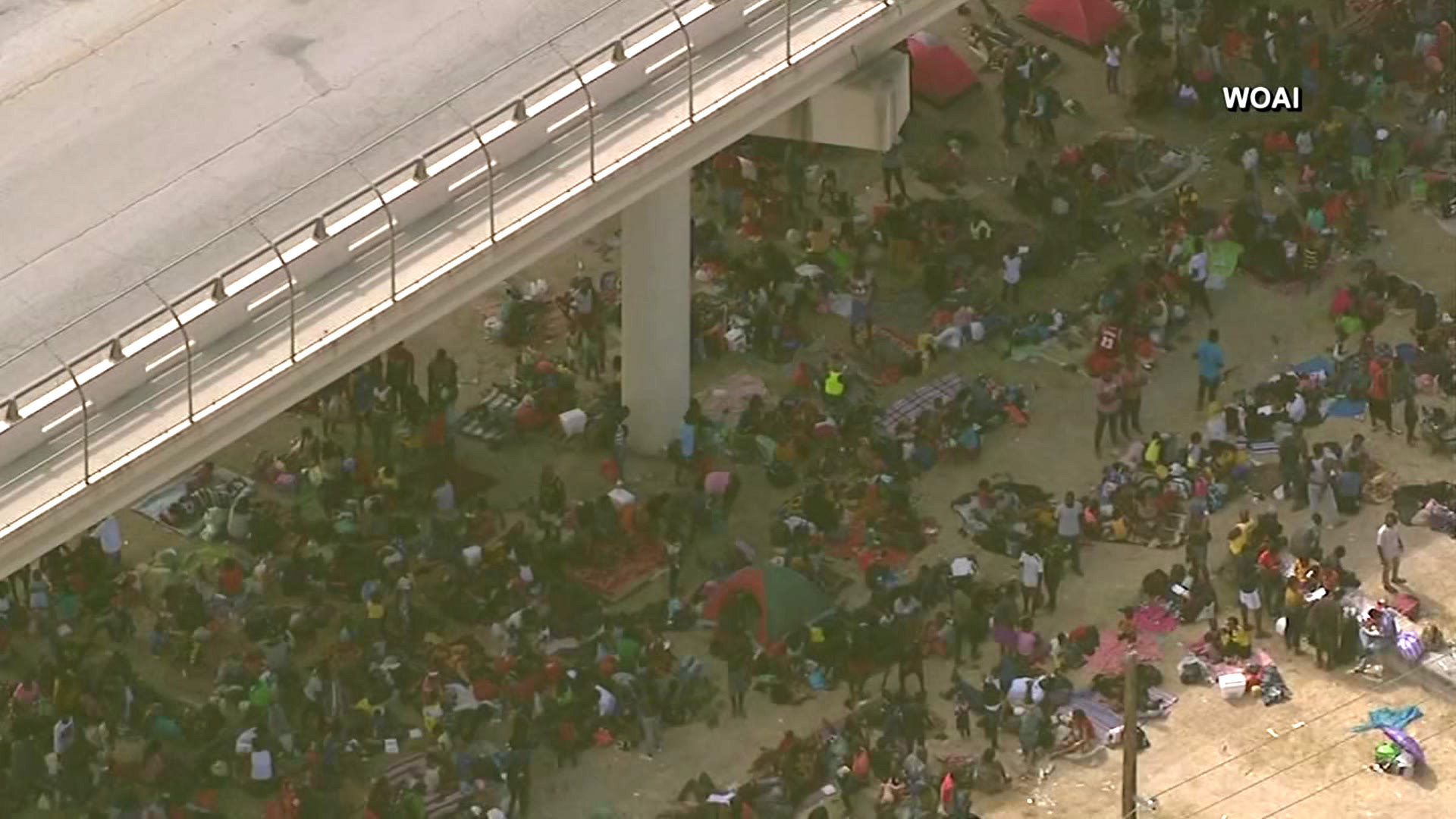Thousands of Haitian migrants have assembled under and around a bridge in a small Texas border town, presenting the Biden administration with a fresh and immediate challenge as it tries to manage large numbers of asylum-seekers who have been reaching U.S. soil.
Images showed Haitians crossing the Rio Grande in huge groups and assembling under a bridge in Del Rio, a city of 35,000 that has been severely strained by migrant flows in recent months.
Estimates were as high as 8,000 to 10,000. The mayor of Del Rio told NBC 5 Friday afternoon there were more than 12,000 migrants packed in at the bridge separating his city from Acuña, Mexico.
Migrants in Del Rio
We're making it easier for you to find stories that matter with our new newsletter — The 4Front. Sign up here and get news that is important for you to your inbox.
Mayors of border towns Del Rio and Eagle Pass are calling the situation dire. The mayor of Del Rio has declared a state of emergency and disaster over the growing crowds.
"I cannot risk the population being on top of the bridge if there's a potential for a stampede," said Del Rio Mayor Bruno Lozano.
Lozano is asking for even more resources to converge under the bridge. He intends on shutting bridge traffic in and out of Del Rio, fearing migrants could rush the border.

"Those of you that think this is a dramatic measure, this is a dramatic time," he said.
There's already an increased presence of agents and officers with the U.S. Customs and Border Patrol and Texas Department of Public Safety, but crossings continue elsewhere. Many are walking freely back and forth across the Rio Grande.
They return to an area under the bridge that has become a makeshift processing center where migrants are claiming asylum. The mayor said it's taking more than a week for many to be processed.
"You can feel the desperation, the destitute, of these individuals," said Lozano. "They're getting aggressive, rightfully so, they've been in the heat day after day and it's something that — it's very challenging to describe — but it is extremely chaotic."
Migrants are grabbing what they can — a tree branch, a blanket — to find relief from the South Texas heat.

Tension in the camp, Lozano warned, is rising. "They're angry. There's people having babies down there. There's people collapsing out of the heat. There's babies in diapers. They haven't bathed," he said.
The conditions are filthy. Clothes and trash are strewn everywhere, but they wait, believing even these conditions are better than life back home.

Haitians have been migrating to the U.S. in large numbers from South America for several years, many of them having left the Caribbean nation after a devastating earthquake in 2010.
After jobs dried up from the 2016 Summer Olympics in Rio de Janeiro, many made the dangerous trek by foot, bus, and car to the U.S. border, including through the infamous Darien Gap, a Panamanian jungle.
It is unclear how such a large number amassed so quickly, though many Haitians have been assembling in camps on the Mexican side of the border, including in Tijuana, across from San Diego, to wait while deciding whether to attempt to enter the United States.
U.S. Customs and Border Protection did not immediately respond to a request for comment Friday.
Video recorded on Thursday showed migrants freely walking across shallow sections of the Rio Grande River from Cuidad Acuña into Del Rio, Texas.
U.S. authorities are being severely tested after President Joe Biden quickly dismantled Trump administration policies that Biden considered cruel or inhumane, most notably one requiring asylum-seekers to remain in Mexico while waiting for U.S. immigration court hearings. Such migrants have been exposed to extreme violence in Mexico and faced extraordinary difficulty in finding attorneys.

The U.S Supreme Court last month let stand a judge's order to reinstate the policy, though Mexico must agree to its terms. The Justice Department said in a court filing this week that discussions with the Mexican government were ongoing.
A pandemic-related order to immediately expel migrants without giving them the opportunity to seek asylum that was introduced in March 2020 remains in effect, but unaccompanied children and many families have been exempt. During his first month in office, Biden chose to exempt children traveling alone on humanitarian grounds.
The U.S. government has been unable to expel many Central American families because Mexican authorities have largely refused to accept them in the state of Tamaulipas, which is across from Texas' Rio Grande Valley, the busiest corridor for illegal crossings.
On Thursday, a federal judge in Washington blocked the administration from applying Title 42, as the pandemic-related authority is known, to any families.

Mexico has agreed to take expelled families only from Mexico, Guatemala, Honduras and El Salvador, creating an opening for Haitians and other nationalities because the U.S. lacks the resources to detain and quickly expel them on flights to their homelands.
In August, U.S. authorities stopped migrants nearly 209,000 times at the border, which was close to a 20-year high even though many of the stops involved repeat crossers because there are no legal consequences for being expelled under Title 42 authority.
People crossing in families were stopped 86,487 times in August, but fewer than one out of every five of those encounters resulted in expulsion under Title 42. The rest were processed under immigration laws, which typically means they were released with a court date or a notice to report to immigration authorities.
U.S. authorities stopped Haitians 7,580 times in August, a figure that has increased every month since August 2020, when they stopped only 55. There have also been major increases of Ecuadorians, Venezuelans, and other nationalities outside the traditional sending countries of Mexico, Guatemala, Honduras, and El Salvador.



